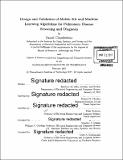| dc.contributor.advisor | Richard R. Fletcher and Peter Szolovits. | en_US |
| dc.contributor.author | Chamberlain, Daniel | en_US |
| dc.contributor.other | Massachusetts Institute of Technology. Department of Electrical Engineering and Computer Science. | en_US |
| dc.date.accessioned | 2017-05-11T19:57:48Z | |
| dc.date.available | 2017-05-11T19:57:48Z | |
| dc.date.copyright | 2017 | en_US |
| dc.date.issued | 2017 | en_US |
| dc.identifier.uri | http://hdl.handle.net/1721.1/108957 | |
| dc.description | Thesis: S.M. in Technology and Policy, Massachusetts Institute of Technology, School of Engineering, Institute for Data, Systems, and Society, Technology and Policy Program, 2017. | en_US |
| dc.description | Thesis: S.M., Massachusetts Institute of Technology, Department of Electrical Engineering and Computer Science, 2017. | en_US |
| dc.description | Cataloged from PDF version of thesis. | en_US |
| dc.description | Includes bibliographical references (pages 107-112). | en_US |
| dc.description.abstract | Pulmonary diseases are responsible for more than 15% of deaths worldwide. Much of this burden is concentrated in the developing world, where these diseases cause 19% of deaths. In much of the developing world, pulmonary diseases are under-diagnosed and misdiagnosed because the correct equipment is not available or health care is provided by workers with insufficient training. To help improve the diagnosis of pulmonary disease, we built a pulmonary diagnostic kit that consists of an electronic stethoscope, an augmented reality peak flow meter, and an electronic questionnaire. Using this kit, we collected data from patients who visited the Chest Research Foundation, a pulmonary clinic in Pune, India. Using the data collected from these patients, we pursued several of avenues of research. First, we trained algorithms to automatically detect two adventitious breath sounds: wheezes and crackles. We used two approaches to detect these sounds: traditional signal processing methods and new techniques from deep semi-supervised learning. Both techniques showed moderate success at identifying wheezes and crackles. Second, we evaluated the diagnostic potential of detecting wheezes and crackles and compared it to using signal processing analysis of lung sounds to directly detect pulmonary disease. We showed that this new technique leads to improved diagnostic accuracy. This finding indicates that future research should focus less on lung sound identification. Third, we combined measurements from all three components of our kit to predict the diagnosis of patients with pulmonary disease. We showed that most of the diagnostic accuracy of the kit was provided by the peak flow meter and questionnaire combination. Together, these two devices were able to accurately detect patients with asthma and COPD. After developing the diagnostic algorithms, we built an Android application to guide a user through the necessary data collection to arrive at a diagnosis. The application was designed to create questionnaires and data queries from an externally defined model definition file, allowing the application to be easily repurposed for different classification tasks in medicine and other fields. Future research will expand the use of the pulmonary diagnostic kit to include additional pulmonary diseases and will test its use in a large-scale field study to determine its accuracy as a screening tool for asthma and COPD. If the results of future trials are consistent with the findings in this thesis, the kit and algorithm combination may provide useful information for improving diagnosis of pulmonary disease. | en_US |
| dc.description.statementofresponsibility | by Daniel Chamberlain. | en_US |
| dc.format.extent | 113 pages | en_US |
| dc.language.iso | eng | en_US |
| dc.publisher | Massachusetts Institute of Technology | en_US |
| dc.rights | MIT theses are protected by copyright. They may be viewed, downloaded, or printed from this source but further reproduction or distribution in any format is prohibited without written permission. | en_US |
| dc.rights.uri | http://dspace.mit.edu/handle/1721.1/7582 | en_US |
| dc.subject | Institute for Data, Systems, and Society. | en_US |
| dc.subject | Technology and Policy Program. | en_US |
| dc.subject | Electrical Engineering and Computer Science. | en_US |
| dc.title | Design and validation of mobile kit and machine learning algorithms for pulmonary disease screening and diagnosis | en_US |
| dc.type | Thesis | en_US |
| dc.description.degree | S.M. in Technology and Policy | en_US |
| dc.description.degree | S.M. | en_US |
| dc.contributor.department | Massachusetts Institute of Technology. Department of Electrical Engineering and Computer Science | |
| dc.contributor.department | Massachusetts Institute of Technology. Engineering Systems Division | |
| dc.contributor.department | Massachusetts Institute of Technology. Institute for Data, Systems, and Society | |
| dc.contributor.department | Technology and Policy Program | |
| dc.identifier.oclc | 986481917 | en_US |
